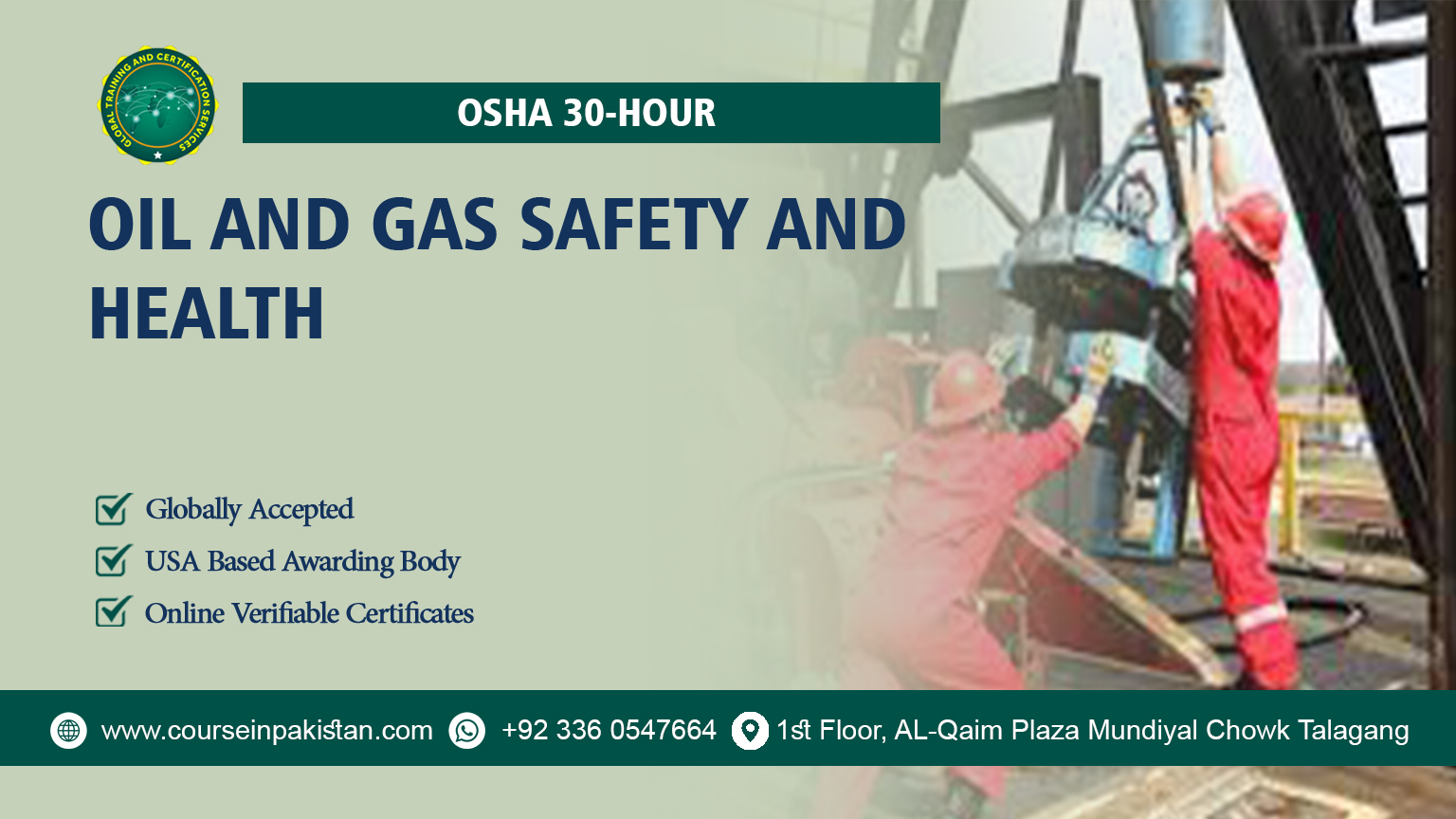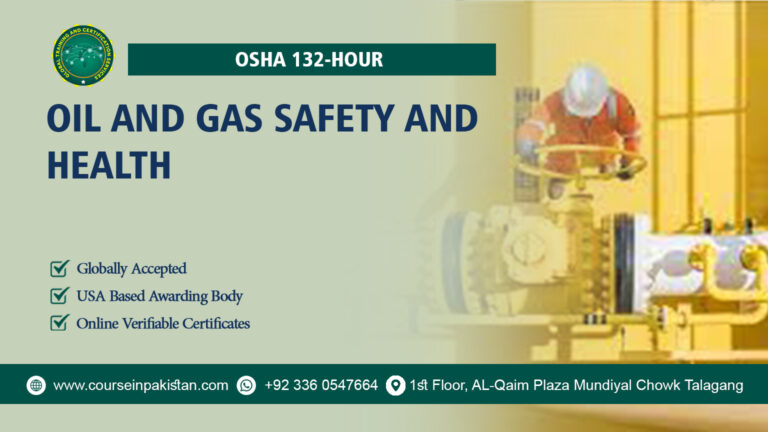
The oil and gas industry is among the most dangerous sectors globally, with workers often facing a variety of health and safety risks. From handling heavy equipment to working with hazardous materials, the industry demands strict safety protocols to minimize accidents and ensure the well-being of employees. One of the best ways to ensure safety is through proper training and certification. The OSHA 30-Hour Oil and Gas Safety and Health Certification is designed to provide comprehensive safety training to professionals working in the oil and gas industry.
This 30-hour certification course offers an in-depth understanding of safety procedures, industry regulations, and best practices, making it an essential qualification for anyone looking to enhance their career in the oil and gas sector.
The OSHA 30-Hour Oil and Gas Safety and Health Certification is a specialized program tailored to meet the safety and health needs of the oil and gas industry. The Occupational Safety and Health Administration (OSHA) has set safety standards to protect workers in various high-risk environments, including oil and gas operations. This course is ideal for safety managers, supervisors, and workers who want to gain a deeper understanding of the regulations and practices that ensure safety in the workplace.
The course provides 30 hours of detailed instruction on the safety standards that apply specifically to the oil and gas industry. It focuses on hazard identification, risk assessment, emergency response, and the proper use of personal protective equipment (PPE). Upon completion, participants will receive an OSHA-issued certificate that is recognized globally and proves their commitment to safety and compliance.
The OSHA 30-Hour Oil and Gas Safety and Health course is a comprehensive training program designed to teach participants how to identify and manage safety hazards within the oil and gas sector. This program is more extensive than the 10-hour OSHA certification, providing a broader understanding of OSHA’s regulations, the intricacies of safety in the oil and gas industry, and advanced risk management techniques.
The course is structured to cover several key areas, from general safety practices to specific regulations and industry standards. It also includes practical assignments and case studies to ensure participants not only understand the theory but can also apply their knowledge in real-world scenarios.
- OSHA Regulations and Standards
- Risk Assessment and Safety Planning
- Hazard Identification and Mitigation
- Emergency Preparedness and Response
- Personal Protective Equipment (PPE)
- Chemical Safety and Spill Prevention
- Incident Investigation and Reporting
- Health and Safety in Oil and Gas Operations
Course Study Units
- Introduction to OSHA and the Oil and Gas Industry
- Respiratory Protection
- Confined Space Entry
- Electrical Safety
- Fire Safety and Prevention
- Safety and Health Programs
- Safety Management Systems
- Hazard Recognition and Control
- Emergency Response Planning
- Personal Protective Equipment (PPE)
- Environmental Safety Practices
- Machine Guarding and Safety
- Process Safety Management (PSM)
- Health Hazards in the Oil and Gas Industry
- Chemical Safety and Hazard Communication
Learning Outcomes
By the end of the OSHA 30-Hour Oil and Gas Safety and Health Certification program, participants will have developed the skills and knowledge necessary to identify, evaluate, and mitigate risks in the oil and gas industry. They will be proficient in implementing safety measures that comply with OSHA standards and will be able to respond effectively to emergencies.
Key learning outcomes include:
- Understanding OSHA Regulations: Participants will have a thorough understanding of OSHA regulations and their application in the oil and gas industry.
- Risk Management Skills: Learners will be able to identify hazards, assess risks, and develop strategies for mitigating them.
- Effective Emergency Response: Graduates will be equipped with the knowledge to respond to emergencies, minimizing harm and damage.
- Health and Safety Management: Participants will gain insights into maintaining a healthy and safe working environment in the oil and gas sector.
- Improved Career Opportunities: The certification will enhance career prospects by providing an essential credential for roles in safety management.
Course Benefits
The OSHA 30-Hour Oil and Gas Safety and Health Certification provides a host of benefits to both individuals and organizations:
- Comprehensive Safety Knowledge: The course provides participants with an in-depth understanding of safety risks and best practices in the oil and gas industry.
- Global Recognition: The certification is recognized worldwide, offering professionals the opportunity to work in various international markets.
- Enhanced Safety Culture: Organizations benefit from a workforce that understands safety protocols, resulting in fewer accidents and improved compliance.
- Career Advancement: The certification provides professionals with the qualifications needed for advancement to higher safety positions within the oil and gas sector.
- Hands-on Learning: The course includes practical assignments and case studies to ensure that participants can apply safety knowledge in real-world situations.
Who Can Enroll in This Course?
The OSHA 30-Hour Oil and Gas Safety and Health Certification is ideal for professionals in the oil and gas industry, particularly those responsible for managing or overseeing safety practices. Eligible participants include:
- Safety Managers and Officers: Professionals responsible for creating and enforcing safety policies in oil and gas operations.
- Supervisors and Foremen: Supervisory personnel who oversee workers and ensure safety standards are met.
- Field Operators: Workers on the ground who need to understand safety measures to protect themselves and their colleagues.
- Project Managers: Managers overseeing oil and gas projects who need a solid understanding of safety protocols.
- Health and Safety Consultants: Professionals offering safety advice to oil and gas companies.
Future Progression for This Course
After completing the OSHA 30-Hour Oil and Gas Safety and Health certification, professionals can pursue additional certifications and career growth in safety management. Future progression options include:
- Advanced Safety Certifications: Individuals can further their expertise by taking advanced safety certifications such as NEBOSH International Safety Certificates or OSHA 40-Hour HAZWOPER certification.
- Specialized Training: Professionals can choose to specialize in specific safety areas like Offshore Safety, Fire Safety, or Environmental Health and Safety.
- Leadership Roles: With this certification, individuals can advance to higher positions such as Safety Director, Health and Safety Manager, or Emergency Response Coordinator.
The OSHA 30-Hour Oil and Gas Safety and Health Certification is a valuable qualification for professionals in the oil and gas sector. By providing essential safety knowledge and practical skills, this course ensures that workers can effectively manage risks, comply with safety regulations, and respond appropriately in emergencies. For anyone seeking to build a career in oil and gas or advance in their safety management roles, this certification is a critical step toward achieving a safer and more successful career.






